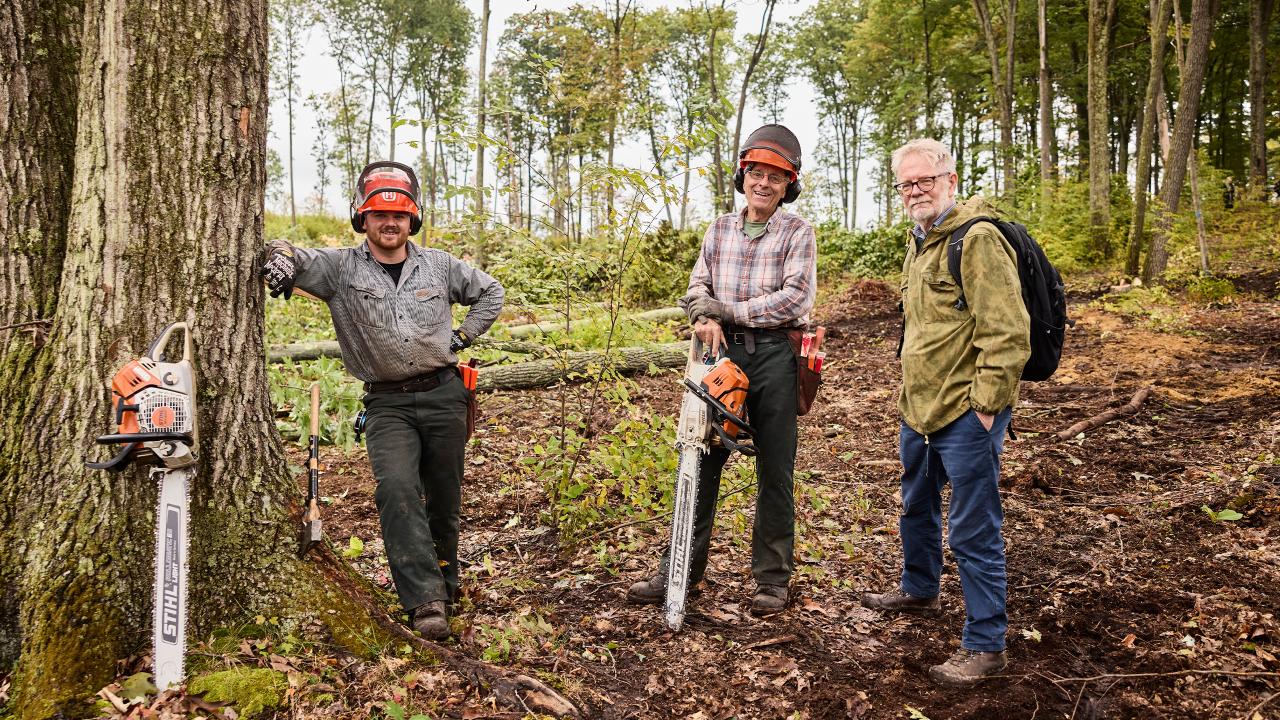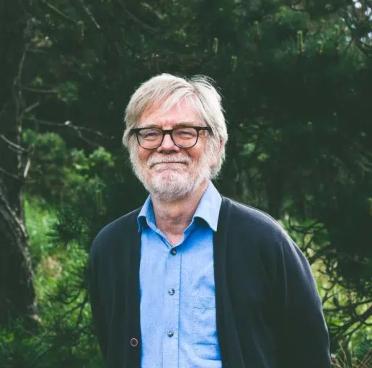
Stewards of the Forest: From acorns to oaks
Image: Denny Payne and Alex Zimmerman at a logging site with Fred Pearce. Photography by Petr Krejci.
From acorns to oaks
Denny Payne is a spry 74-year-old, still out every day with his chainsaw in the forests of Western Pennsylvania. But today, he is as keen on the acorns at his feet as on the giant red oak he has just felled. He picks up a handful. “These are the next generation,” he says, “the trees that will replace the ones we are cutting.”
He smiles at his companion. “It’s a bit like me and Alex here, my grandson,” he says. “I’m gonna retire soon. Alex is the next generation of loggers. He is 27. Maybe he will be here to harvest that acorn when it grows big someday.”
Denny and Alex are a grandfather and grandson chainsaw team. A unique combo that always works together on logging contracts, they are famous among foresters in this part of the state. Denny keeps putting off retirement. “I enjoy it too much,” he says. “Maybe next year.”
The pair were in the final days of a year-long job cutting trees near the township of Benezette, for the Brownlee Lumber sawmill in nearby Brookville. Brownlee, another family business in its 50th year, was in turn under contract with the state government’s Department of Conservation and Natural Resources, which owns and manages the forest for future generations.
“We have been working through this area of around 80 acres for several months,” says Alex. “It’s mostly red oak, with a few cherry trees, some soft maple and tulipwood. We are taking out some mature trees, but leaving others to provide acorns for regeneration.” The trees are mostly 80 to 100 years old - the product of natural regeneration after the area, like most of the state’s forests, was logged out at the beginning of the 20th century.
These days, state and federal foresters have detailed management plans to maintain a healthy forest. “They want to regenerate with the oak, poplar and cherry again,” says Denny. The result, they hope, will be a continuation of the current diverse forest that pays its way by providing revenue for the authorities and sawmills, and jobs for forest workers, like Denny and Alex.
“I notice over the years how amazingly quickly the regeneration often comes back,” says Denny. “These dark soils are good for regeneration.” Its main threat here is the elks that eat small saplings. Elk are in profusion around here. Just down the road, Benezette is known as the state’s elk capital, and conservationists have created a popular elk visitor centre around pastures that the animals favor.
But Denny is careful to keep them away from newly cut areas so the acorns have a chance. He points back up the skid trail. “Where you drove in, that was thinned three years ago, and already the new trees are eight or ten feet tall. And you can see the acorns on the forest floor here, so this will grow quickly too.” He looks around. “Here is one oak, growing already. Once it gets some sunlight it’ll really take off.”
--
Logging is a family business in the hardwood forests of Western Pennsylvania. Many of the families in Wilcox, the community where Denny and Alex live, and nearby Kane, on the edge of the Allegheny National Forest, have been cutting trees for generations.
“My great grandfather cleared trees with an axe and pulled out the logs with horses,” says Denny. “I learned the business by working with my father. I have two brothers who worked in the woods with me. One of them had a log yard. My son logged with me too, and now my grandson Alex – and he has a new baby, so maybe that’s another generation.”
But Alex fears logging is becoming an old man’s business. “Personally, I wouldn’t want to do anything else,” he says. “But my generation aren’t coming into the industry so much now. It’s hard work, and they have other options.” Family ties are loosening, and the economics can be precarious. Buying equipment is expensive.
Denny and Alex are well set up, however. Dan Brownlee, who founded Brownlee Lumber in 1973, is an old associate. “We’ve worked with them for many years now,” says Denny. “They keep us busy. When we are done here in a couple of weeks, we expect they will have another job lined up for us.”
Denny’s long experience also means he can have a bigger say in what the pair do. “They will show us a map, give us the acreage and volumes to be cut, what species, and what lengths they want the logs. Then we’ll work together on a logging plan,” he says. “We are supervised by state foresters, but they trust us.”
Denny has always worked within commuting distance of his home in Wilcox. “I see my wife, Sharon, every night, and she makes me sandwiches before I go out every morning. She would like me to stop, but she sees how much I love my work.”
Back home, over beers in Denny’s garage-cum-workshop, Alex shows on his phone some film of his grandfather working as a young man, and points to the garage walls with the numerous medals and awards Denny has won. Behind the garage is the house that Denny built for himself from forest lumber 40 years ago.
Denny says he knew a local guy who had a stand of hemlock for sale. So, he bought it and cut the trees on the weekends. “Then my dad came down and helped me haul the logs to a sawmill, where my brothers and I cut the boards. We piled them up for three months to dry, and then got another fellow to plane them, before we brought them here. The builders I hired said we had enough lumber for two houses, but we only wanted one. Sharon and I have been here ever since.”
Down the road at Brownlee’s sawmill, hundreds of red oak logs are piled high in the yard. One pile alone is worth $100,000 says chief operating officer Tim Brownlee, Dan’s son. Many of the logs have initials carved into the end showing who cut them. “DP” and “AZ”, for Denny Payne and Alex Zimmerman, are the most frequent.
“Pennsylvania’s got about 10% of its employment in the timber industry. So it’s a significant part of the culture and ecosystem round here,” says Tim. “If we can harvest this timber and bring it to international markets, that helps to protect the forests here. If they ceased to have economic value, there would be a real danger of the land being converted to some other use. But what’s valuable gets protected.”
And the best news, he says, is the sheer reproductive potential of the hardwoods here in the Northern Appalachians. “They are amazing. You don’t have to replant them. They put out an enormous quantity of seeds for themselves, and when you harvest you expose the land to sunlight, and the seeds just sprout back.”
“If anyone thinks we are running out of forests in America, they’ve never come through here,” he says. “We look after the trees as well as making money from them.”
And Denny, who in the fall of 2024 will have had 60 years working in the woods, could make a good case for being the greatest steward of them all.
